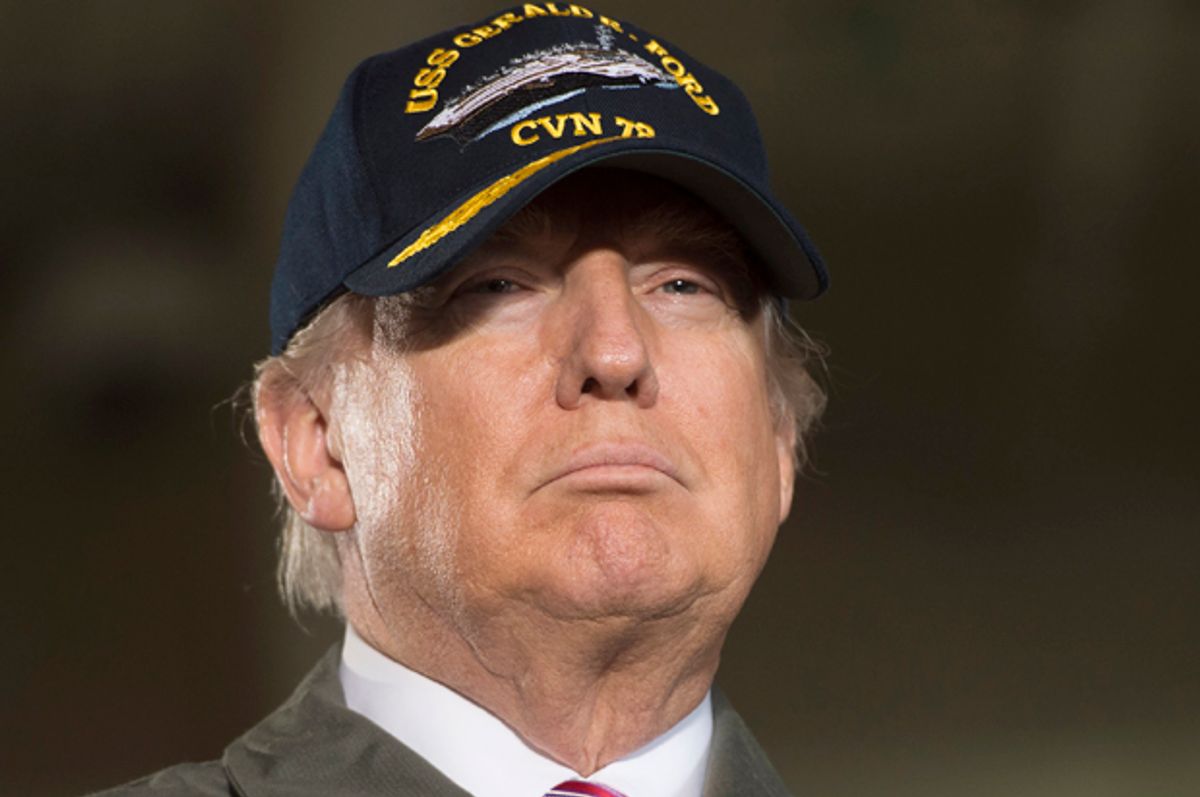On Thursday President Donald Trump stood in the hangar bay of the USS Gerald Ford, America’s next aircraft carrier, and made his case for a future military mission of old-fashioned gunboat diplomacy:
This carrier and the new ships in the Ford class will expand the ability of our nation to carry out vital missions on the oceans to project American power in distant lands. Hopefully, it's power we don’t have to use, but if we do, they're in big, big trouble.
We as a nation have come a long way from “Speak softly and carry a big stick.”
An axiom of Trump’s campaign rhetoric held that the American military has become a hollowed-out shell of its once-mighty self. It seems reasonable to suggest that 15 years of wars in central Asia, the Middle East and elsewhere have worn down our soldiers, their equipment, and their ability to wage war.
The Trumpian answer to this problem is not a consideration of pulling back or retrenching. In keeping with how Trump has run his business empire, he is pushing an ethos of more: more ships, more planes, more soldiers, more ability for the nation to wage war in distant lands. Last week he unveiled a budget proposal that, like all presidential budgets, is a good indicator of administration priorities.
Trump’s budget framework proposes massive cuts across the government while increasing spending on the military in the next fiscal year by about 10 percent, or $54 billion. America already spends more on its military than the next seven largest militaries combined. If Trump gets his way, that gap will noticeably increase.
At the same time, the administration is promising massive cuts to the State Department and America’s diplomatic efforts around the world. As Ana Marie Cox and Jane Coaston noted in a piece for MTV:
This sends a message to both our allies and enemies . . . that military might means more to us than statecraft. Second, the proposed budget cut simply reflects the process of de-prioritizing diplomacy that is already underway in the Trump administration.
During his speech on the USS Gerald Ford, Trump also hit on another right-wing talking point that he had often repeated on the campaign trail. He told his audience that our Navy is now “the smallest it’s been since World War I.” (This is at best a misleading statement.) He promised to increase the size of the nation’s naval fleet, to expand the number of operational aircraft carriers to 12 from the current 10 (which is still more than the rest of the world’s navies combined have in their fleets).
Trump and his administration are throwing money at a problem that does not actually exist. The U.S. Navy may be smaller than it has been for 100 years, but its power — relative to the navies of the rest of the world — is still enormous, even after being worn down by the past decade and a half of constant engagement in conflicts.
All presidential administrations of the last half a century have had a martial bent in some way. In terms of using the military as a prop for jingoistic triumphalism, Trump’s speech on the USS Gerald Ford is not even close to being the most egregious among modern presidents' rhetoric. (That honor still belongs to George W. Bush’s flight suit-clad “Mission Accomplished” moment on another aircraft carrier in 2003.)
What makes this moment feel so much more freighted is this administration’s expressed desire to project a throwback to a pre-World War II mindset. As Trump adviser Steve Bannon said in an interview just after November's election:
[I]t's the greatest opportunity to rebuild everything. Shipyards, ironworks, get them all jacked up. . . . It will be as exciting as the 1930s, greater than the Reagan revolution — conservatives, plus populists, in an economic nationalist movement.
Still, even with the great military buildups of the past — Reagan’s in the 1980s, for example — diplomacy was not left on the sidelines. Past presidents understood that a combination of soft power (diplomacy) and hard (military) was necessary to secure America’s place in the world.
The Trump team does not care about the former, and wants to, as Bannon might say, jack up application of the second. Combined with an incompetent and impulsive president and Bannon’s stated desire to destroy the post-World War II liberal international order, this unapologetic, chest-beating nationalism feels like we're nearing an ever more dangerous moment.



Shares